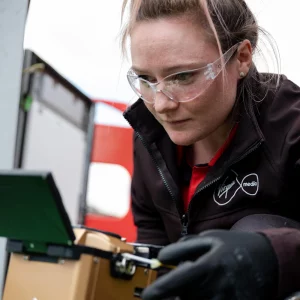Sponsored Links
Fluidata UK ISP Boss on the Difficulty of Remembering IPv6 Internet Addresses
Posted: 25th Jul, 2011 By: MarkJ

 The Managing Director of UK business ISP Fluidata, Piers Daniell, has warned that one of the biggest human challenges of adapting to work with the new generation of IPv6 internet addresses is, at least during training, simply being able to remember them.
The Managing Director of UK business ISP Fluidata, Piers Daniell, has warned that one of the biggest human challenges of adapting to work with the new generation of IPv6 internet addresses is, at least during training, simply being able to remember them. A standard IPv4 address is seamlessly assigned to your computer each time you go online (e.g. 46.247.0.11) and acts kind of like a phone number for your internet link, allowing you to communicate with other systems and servers. Numbers like that aren't too difficult to remember but just try holding the IPv6 alternative up in your head: 2a00:0f18:0006:0000:0000:0001:0000:0102.
Fluidata's MD, Piers Daniell, Explains:
"I would imagine if you spoke to most IT people within your company they would have a few IP addresses in their head – the IP for your internal DNS server for instance, the IP for the gateway, maybe even the public IP that you need to dial for your VPN to work. But what is going to happen with IPv6 – how is anyone going to remember the IP?
The IP of my company website for example with IPv4 is 46.247.0.11 but in IPv6 that changes to: 2a00:0f18:0006:0000:0000:0001:0000:0102. However there is light at the end of the tunnel as you can shorten the address by dropping unnecessary zeros so it can be written as 2a00:f18:6::1:0:102 – but it is still pretty complex and not something easily remembered.
Obviously DNS is there to help as it is much easier to remember www.fluidata.co.uk but you can’t always use it especially in configurations. I am sure we will see more software developed to help with this issue or alternatively we will see some imaginative uses of IPv6 addresses – like Facebook who use 2620::1cfe:face:b00c:0:0:3v. [The BBC also use 2001:4b10:bbc::1]"
"I would imagine if you spoke to most IT people within your company they would have a few IP addresses in their head – the IP for your internal DNS server for instance, the IP for the gateway, maybe even the public IP that you need to dial for your VPN to work. But what is going to happen with IPv6 – how is anyone going to remember the IP?
The IP of my company website for example with IPv4 is 46.247.0.11 but in IPv6 that changes to: 2a00:0f18:0006:0000:0000:0001:0000:0102. However there is light at the end of the tunnel as you can shorten the address by dropping unnecessary zeros so it can be written as 2a00:f18:6::1:0:102 – but it is still pretty complex and not something easily remembered.
Obviously DNS is there to help as it is much easier to remember www.fluidata.co.uk but you can’t always use it especially in configurations. I am sure we will see more software developed to help with this issue or alternatively we will see some imaginative uses of IPv6 addresses – like Facebook who use 2620::1cfe:face:b00c:0:0:3v. [The BBC also use 2001:4b10:bbc::1]"
Daniell warns that "most IT Managers" can expect to face difficulties like this over the coming years, although it's not limited to them. A literate IT person will also be mindful of IP addresses and the harder they are to remember the longer it will take to do what you want (e.g. diagnosing problems in your home network or server setup).
Sadly there is little choice but to adapt. The Internet Assigned Numbers Authority (IANA) allocated its remaining blocks of IPv4 internet addresses to the worlds five RIR's in February 2011 and one of those, APNIC, has effectively already run out (here). The remaining RIR's will soon follow.
Search ISP News
Search ISP Listings
Search ISP Reviews
Latest UK ISP News








Cheap BIG ISPs for 100Mbps+
150,000+ Customers | View More ISPs
Cheapest ISPs for 100Mbps+
Modest Availability | View More ISPs
Latest UK ISP News
Helpful ISP Guides and Tips
Sponsored Links
The Top 15 Category Tags
- FTTP (6802)
- BT (3881)
- Politics (3075)
- Business (2767)
- Openreach (2663)
- Building Digital UK (2512)
- Mobile Broadband (2475)
- FTTC (2142)
- Statistics (2128)
- 4G (2092)
- Virgin Media (2025)
- Ofcom Regulation (1779)
- 5G (1732)
- Fibre Optic (1604)
- Wireless Internet (1595)
Sponsored
Copyright © 1999 to Present - ISPreview.co.uk - All Rights Reserved - Terms , Privacy and Cookie Policy , Links , Website Rules






























